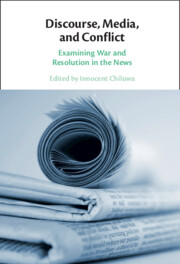Book contents
- Discourse, Media, and Conflict
- Discourse, Media, and Conflict
- Copyright page
- Contents
- Figures
- Tables
- About the Authors
- Foreword
- Introduction
- Part I Conflict Discourse in Newspaper Reporting
- Part II Electronic Media and Online Discourses of Conflict
- Part III Media Discourse and Conflict Resolution
- 10 The Language of Peace in Conflict Transformation
- 11 The Historical Context in Media Narratives in Search of Peaceful Resolution to the Israel–Palestine Conflict
- 12 From Peace Talks to Military Operation
- 13 From Collision to Diplomatic Compromise
- 14 Constructing Identities in Crisis Situations
- Conclusion
- Index
- References
11 - The Historical Context in Media Narratives in Search of Peaceful Resolution to the Israel–Palestine Conflict
A Comparative Study of BBC and Al Jazeera
from Part III - Media Discourse and Conflict Resolution
Published online by Cambridge University Press: 21 April 2022
- Discourse, Media, and Conflict
- Discourse, Media, and Conflict
- Copyright page
- Contents
- Figures
- Tables
- About the Authors
- Foreword
- Introduction
- Part I Conflict Discourse in Newspaper Reporting
- Part II Electronic Media and Online Discourses of Conflict
- Part III Media Discourse and Conflict Resolution
- 10 The Language of Peace in Conflict Transformation
- 11 The Historical Context in Media Narratives in Search of Peaceful Resolution to the Israel–Palestine Conflict
- 12 From Peace Talks to Military Operation
- 13 From Collision to Diplomatic Compromise
- 14 Constructing Identities in Crisis Situations
- Conclusion
- Index
- References
Summary
The chapter engages in a Critical Discourse Analysis of the language used in the media reporting of the most recent prime ministerial elections in Israel, in 2019. It draws on the tradition of Cultural-Historical and Activity Theory to highlight the impact of the wider historical context of the Israel–Palestine conflict in the media reporting of events in the region. It is a comparative study of the BBC’s and Al Jazeera’s reporting of the elections, examining a period from August 2019 (the pre-election period) through to October 2019 (the immediate post-election period). The data collected consists of six and nine online reports by the BBC and Al Jazeera, respectively. An overriding aim is an examination of the impact and the role of the history of the region in reporting on significant events. The work aims to contribute to other studies on the Israel–Palestine conflict which have argued that media is a contested space, and the news is not a neutral product.
Keywords
- Type
- Chapter
- Information
- Discourse, Media, and ConflictExamining War and Resolution in the News, pp. 257 - 277Publisher: Cambridge University PressPrint publication year: 2022
References
- 1
- Cited by



